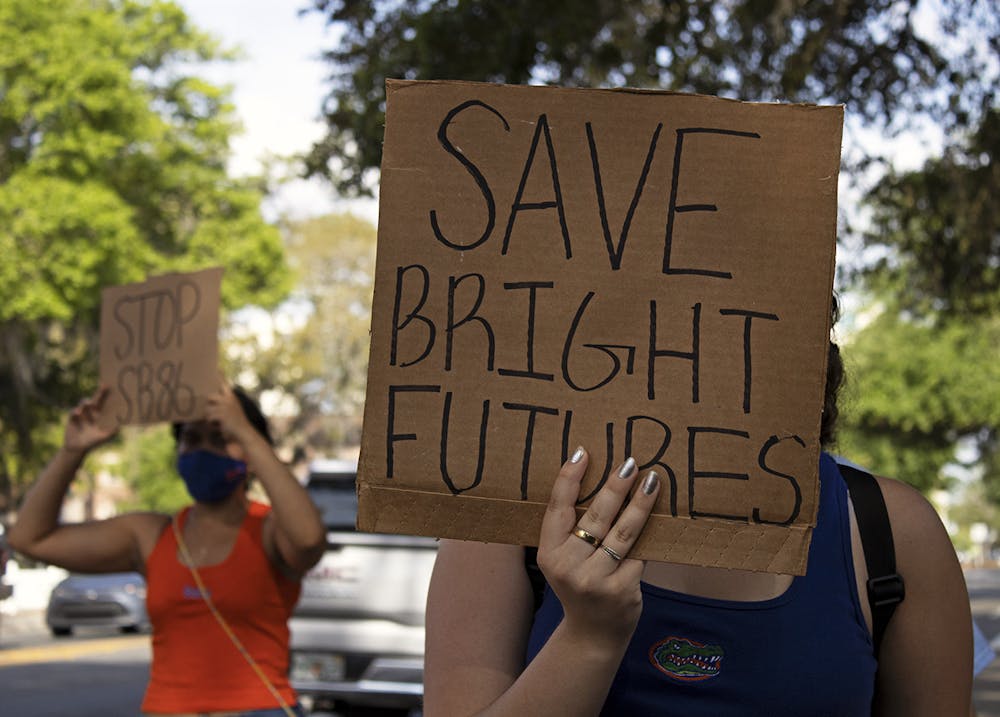Kendall Lindsay made her decision about where to go to college with one key thought in mind –– how her family would afford degrees for its graduating triplets.
Lindsay, 18, turned down her early admission to Duke University to attend UF next Fall because she knew the Bright Futures scholarship program would fully fund her in-state tuition.
But, when she heard about the Florida Senate bill that proposed to change funding for the program thousands of students across the state rely on to attend college, she started to worry.
“I definitely would reconsider choosing the University of Florida over Duke because, without that full ride, I could have gotten to go to Duke for about the same price,” she said.
Lindsay’s not alone in her worries about college funding. Students and parents across the state protested the bill for weeks, leading senators to remove the bill’s most controversial aspects, which included making certain majors ineligible for full funding through the scholarship. Still, the legislation continues to gather attention as it moves toward the Senate floor with language that no longer specifies how much students will receive through Bright Futures. The bill will be heard again by the Appropriations Committee Wednesday.
Currently, Florida Academic Scholars receive funds for 100% of tuition and fees, while Florida Medallion Scholars receive 75%. The bill proposes Bright Futures awards will be “equal to the amount specified in the General Appropriations Act,” which determines the state’s budget each year. This means Bright Futures award amounts could change every year when the annual budget passes.
Students and families questioned their future plans and finances when the bill was first proposed and are still worried about funding not being guaranteed for students.
“My family is depending on Bright Futures to help my kids get through college,” Lindsay’s mother, Amy Lindsay, said.
Without Bright Futures, the Lindsays would have to dip into their retirement funds and savings, and the kids would need to take on jobs during their studies. Amy would probably have to find a second job as well, she said.
As for any schooling beyond college, she said her kids might have to delay that if they aren’t awarded Bright Futures funding.
“I am very stressed out,” she said, referring to the initial proposal of the bill. “I am trying to think about what and how we are going to do to pay for this.”
When the bill was first proposed, students and families had to consider how they would balance college degree choices with family budgets.
Leslie Winograd, the mother of an 18-year-old high school senior from Boca Raton, said taking away the affordability of staying in Florida for college would drive young talent away. High-achieving students would likely opt for out-of-state schools, she said, as they often receive merit-based scholarships that lower the tuition to be close to in-state tuition prices.
“I just don’t know what they were thinking,” she said. “It was a dumba-- thing to do. It’s just stupid.”
Jessica Winograd, her 18-year-old daughter, said she has never been a science-oriented person.
While Jessica has not fully settled on her major yet, she knows she wants to pursue a career in liberal arts. She emphasized the importance of having bright students in all fields in the workforce.
“You need teachers and social workers,” she said. “You can’t just have a bunch of scientists running around.”
Lexie Sealy, an 18-year-old who is starting at UF this Fall, has practiced five types of dance since she was 6 years old and dreams of opening a dance studio for underprivileged children.
But because of the Bright Futures bill, she thought about leaving behind the dance degree she would pursue in college. She even contemplated not attending college at all.
Sealy had to work hard to receive Bright Futures. After countless tutoring sessions, she said she drove three hours from her home in Coral Springs to the nearest open SAT testing site, as many closed due to the COVID-19 pandemic. This was the third time she took the exam to earn the minimum score for full funding.
She was stressed when she heard about the bill and questioned the need for a college education in her dance career, even though she knew a dance degree would help her refine her passion.
“It was kind of a push and pull because it is something that I have always wanted to do, but it is going to be so much more expensive for my family to be able to let me live out those dreams,” she said.
Alachua County high school seniors have also expressed outrage about potential changes to Bright Futures funding.
Luke Bennett, an 18-year-old Eastside High School senior, said he qualifies for the highest level of the Bright Futures scholarship, which covers 100% of in-state public tuition. As an active member of his school’s drama club, he said he initially thought about either pursuing a minor or double-major in theatre alongside business management or political science. After hearing about original provisions in the Florida bill, he began to reconsider. “I want to be able to go to college and do whatever I want to do,” Bennett said. “But I’m relying pretty heavily on Bright Futures.”
Avery Sperbeck, an 18-year-old Gainesville High School senior who decided to attend UF as a finance major for Fall 2021, said Bright Futures funding influenced his decision to attend an in-state college.
Sperbeck is a candidate for the Cambridge Advanced International Certificate of Education Diploma (AICE), a program that automatically qualifies a student for the highest level of funding upon successful completion.
He said seniors across Alachua County public schools have continued to fight against the changes by speaking out over social media. Above all, he believes it’s not right that those who depend on the funding may be dissuaded from choosing a Florida college.
“Everybody should be encouraged to follow their passions and not feel pressured or financially motivated to go into a STEM field where they might not be as happy or it's not their true passion,” he said. “I don't think they should feel any less valid in their choices.”
Juliana Ferrie contributed to this report.
Contact Alan Halaly and Carolina Ilvento at ahalaly@alligator.org and cilvento@alligator.org. Follow them on Twitter @AlanHalaly and @CarolinaIlvento.

Alan Halaly is a third-year journalism major and the Spring 2023 Editor-in-Chief of The Alligator. He's previously served as Engagement Managing Editor, Metro Editor and Photo Editor. Alan has also held internships with the Miami New Times and The Daily Beast, and spent his first two semesters in college on The Alligator’s Metro desk covering city and county affairs.

Carolina is a second-year journalism major with a minor in sustainability. In the past, she covered stories and events for WUFT, and she is now reporting on Student Government for The Alligator. Carolina loves to do yoga and go to the beach whenever she isn't writing.






